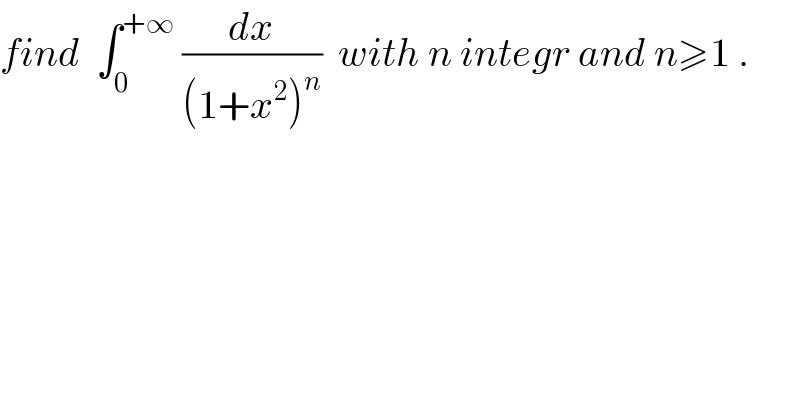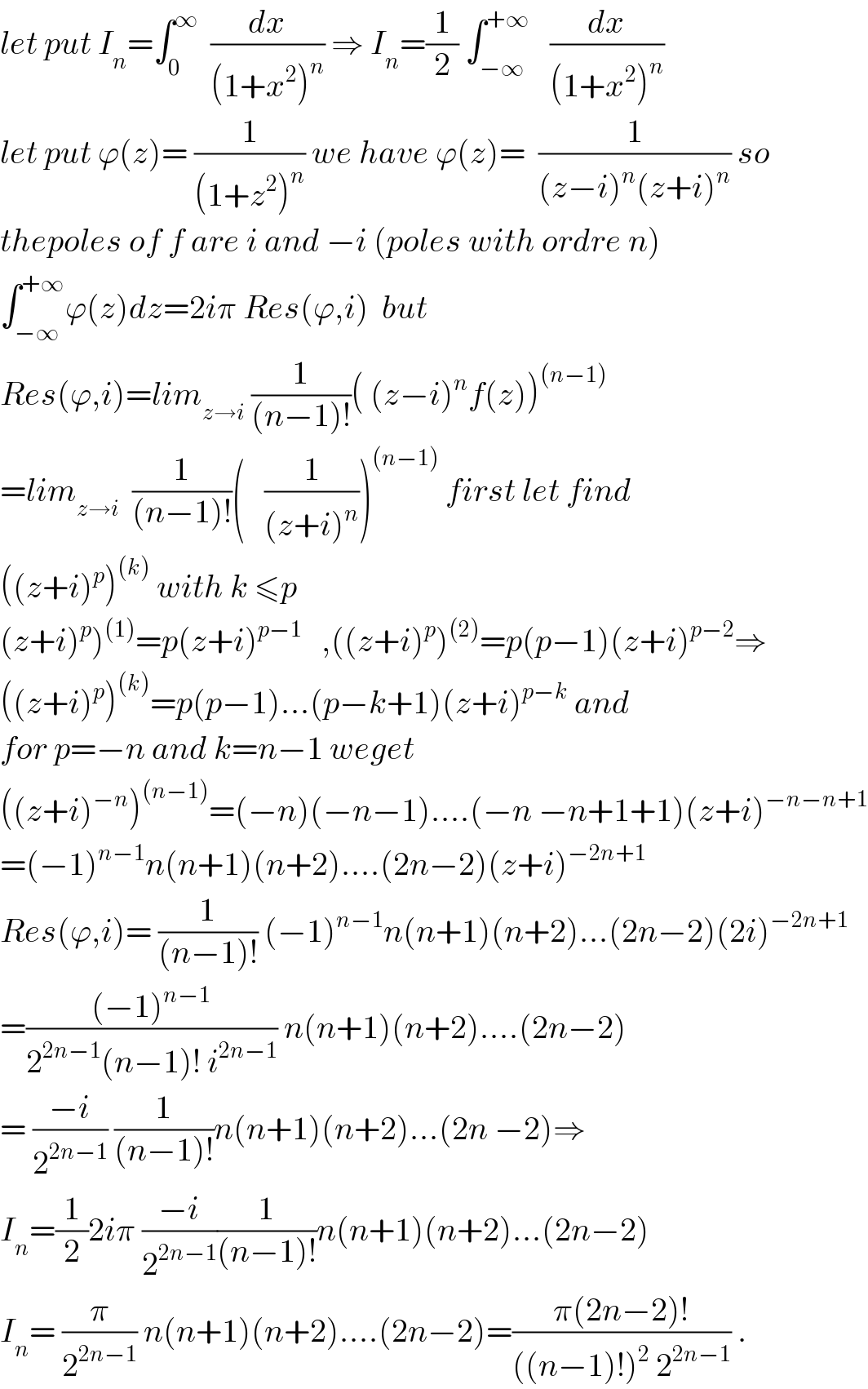
Question Number 31296 by abdo imad last updated on 05/Mar/18

$${find}\:\:\int_{\mathrm{0}} ^{+\infty} \:\frac{{dx}}{\left(\mathrm{1}+{x}^{\mathrm{2}} \right)^{{n}} }\:\:{with}\:{n}\:{integr}\:{and}\:{n}\geqslant\mathrm{1}\:. \\ $$
Commented by NECx last updated on 07/Mar/18

$${thats}\:{the}\:{greatest}\:{lie}\:{of}\:{the}\:{century}. \\ $$
Commented by abdo imad last updated on 06/Mar/18

$${let}\:{put}\:{I}_{{n}} =\int_{\mathrm{0}} ^{\infty} \:\:\frac{{dx}}{\left(\mathrm{1}+{x}^{\mathrm{2}} \right)^{{n}} }\:\Rightarrow\:{I}_{{n}} =\frac{\mathrm{1}}{\mathrm{2}}\:\int_{−\infty} ^{+\infty} \:\:\:\frac{{dx}}{\left(\mathrm{1}+{x}^{\mathrm{2}} \right)^{{n}} }\: \\ $$$${let}\:{put}\:\varphi\left({z}\right)=\:\frac{\mathrm{1}}{\left(\mathrm{1}+{z}^{\mathrm{2}} \right)^{{n}} }\:{we}\:{have}\:\varphi\left({z}\right)=\:\:\frac{\mathrm{1}}{\left({z}−{i}\right)^{{n}} \left({z}+{i}\right)^{{n}} }\:{so} \\ $$$${thepoles}\:{of}\:{f}\:{are}\:{i}\:{and}\:−{i}\:\left({poles}\:{with}\:{ordre}\:{n}\right) \\ $$$$\int_{−\infty} ^{+\infty} \varphi\left({z}\right){dz}=\mathrm{2}{i}\pi\:{Res}\left(\varphi,{i}\right)\:\:{but} \\ $$$${Res}\left(\varphi,{i}\right)={lim}_{{z}\rightarrow{i}} \:\frac{\mathrm{1}}{\left({n}−\mathrm{1}\right)!}\left(\:\left({z}−{i}\right)^{{n}} {f}\left({z}\right)\right)^{\left({n}−\mathrm{1}\right)} \\ $$$$={lim}_{{z}\rightarrow{i}} \:\:\frac{\mathrm{1}}{\left({n}−\mathrm{1}\right)!}\left(\:\:\:\frac{\mathrm{1}}{\left({z}+{i}\right)^{{n}} }\right)^{\left({n}−\mathrm{1}\right)} \:{first}\:{let}\:{find} \\ $$$$\left(\left({z}+{i}\right)^{{p}} \right)^{\left({k}\right)} \:{with}\:{k}\:\leqslant{p} \\ $$$$\left.\left({z}+{i}\right)^{{p}} \right)^{\left(\mathrm{1}\right)} ={p}\left({z}+{i}\right)^{{p}−\mathrm{1}} \:\:\:,\left(\left({z}+{i}\right)^{{p}} \right)^{\left(\mathrm{2}\right)} ={p}\left({p}−\mathrm{1}\right)\left({z}+{i}\right)^{{p}−\mathrm{2}} \Rightarrow \\ $$$$\left(\left({z}+{i}\right)^{{p}} \right)^{\left({k}\right)} ={p}\left({p}−\mathrm{1}\right)...\left({p}−{k}+\mathrm{1}\right)\left({z}+{i}\right)^{{p}−{k}} \:{and} \\ $$$${for}\:{p}=−{n}\:{and}\:{k}={n}−\mathrm{1}\:{weget} \\ $$$$\left(\left({z}+{i}\right)^{−{n}} \right)^{\left({n}−\mathrm{1}\right)} =\left(−{n}\right)\left(−{n}−\mathrm{1}\right)....\left(−{n}\:−{n}+\mathrm{1}+\mathrm{1}\right)\left({z}+{i}\right)^{−{n}−{n}+\mathrm{1}} \\ $$$$=\left(−\mathrm{1}\right)^{{n}−\mathrm{1}} {n}\left({n}+\mathrm{1}\right)\left({n}+\mathrm{2}\right)....\left(\mathrm{2}{n}−\mathrm{2}\right)\left({z}+{i}\right)^{−\mathrm{2}{n}+\mathrm{1}} \\ $$$${Res}\left(\varphi,{i}\right)=\:\frac{\mathrm{1}}{\left({n}−\mathrm{1}\right)!}\:\left(−\mathrm{1}\right)^{{n}−\mathrm{1}} {n}\left({n}+\mathrm{1}\right)\left({n}+\mathrm{2}\right)...\left(\mathrm{2}{n}−\mathrm{2}\right)\left(\mathrm{2}{i}\right)^{−\mathrm{2}{n}+\mathrm{1}} \\ $$$$=\frac{\left(−\mathrm{1}\right)^{{n}−\mathrm{1}} }{\mathrm{2}^{\mathrm{2}{n}−\mathrm{1}} \left({n}−\mathrm{1}\right)!\:{i}^{\mathrm{2}{n}−\mathrm{1}} }\:{n}\left({n}+\mathrm{1}\right)\left({n}+\mathrm{2}\right)....\left(\mathrm{2}{n}−\mathrm{2}\right) \\ $$$$=\:\frac{−{i}}{\mathrm{2}^{\mathrm{2}{n}−\mathrm{1}} }\:\frac{\mathrm{1}}{\left({n}−\mathrm{1}\right)!}{n}\left({n}+\mathrm{1}\right)\left({n}+\mathrm{2}\right)...\left(\mathrm{2}{n}\:−\mathrm{2}\right)\Rightarrow \\ $$$${I}_{{n}} =\frac{\mathrm{1}}{\mathrm{2}}\mathrm{2}{i}\pi\:\frac{−{i}}{\mathrm{2}^{\mathrm{2}{n}−\mathrm{1}} }\frac{\mathrm{1}}{\left({n}−\mathrm{1}\right)!}{n}\left({n}+\mathrm{1}\right)\left({n}+\mathrm{2}\right)...\left(\mathrm{2}{n}−\mathrm{2}\right) \\ $$$${I}_{{n}} =\:\frac{\pi}{\mathrm{2}^{\mathrm{2}{n}−\mathrm{1}} }\:{n}\left({n}+\mathrm{1}\right)\left({n}+\mathrm{2}\right)....\left(\mathrm{2}{n}−\mathrm{2}\right)=\frac{\pi\left(\mathrm{2}{n}−\mathrm{2}\right)!}{\left(\left({n}−\mathrm{1}\right)!\right)^{\mathrm{2}} \:\mathrm{2}^{\mathrm{2}{n}−\mathrm{1}} }\:. \\ $$
Commented by NECx last updated on 07/Mar/18

$${wow}.....\:{Prof}\:{Abdo}\:{Imad},{I}'{m}\:{so} \\ $$$${amased}\:{by}\:{the}\:{questions}\:{you} \\ $$$${solve}.{Thanks}\:{for}\:{you}\:{help}\:{on}\:{the} \\ $$$${platform}. \\ $$
Commented by NECx last updated on 07/Mar/18

$${If}\:{I}\:{may}\:{ask},{which}\:{aspect}\:{of} \\ $$$${integration}\:{is}\:{this}\:\:? \\ $$
Commented by NECx last updated on 07/Mar/18

$${this}\:{is}\:{because}\:{I}\:{always}\:{notice} \\ $$$${that}\:{you}\:{always}\:{apply}\:{complex} \\ $$$${values}\:{to}\:{your}\:{integrals}. \\ $$
Commented by prof Abdo imad last updated on 07/Mar/18

$${its}\:{only}\:{integration}\:{by}\:{residus}\:{theorem}.... \\ $$
Commented by prof Abdo imad last updated on 07/Mar/18

$${I}\:{am}\:{given}\:{all}\:{my}\:{time}\:{to}\:{integration}\:{because} \\ $$$${its}\:{contain}\:{all}\:{comsepts}\:{of}\:{analysis}... \\ $$
Commented by NECx last updated on 07/Mar/18

$${wow}....\:{i}'{m}\:{most}\:{grateful} \\ $$
Commented by NECx last updated on 07/Mar/18

$${I}'{ve}\:{heard}\:{of}\:{the}\:{theorem}\::\:{cauchy} \\ $$$${residue}\:{theorem}.{It}\:{has}\:{to}\:{do}\:{with} \\ $$$${comlex}\:{analysis}.{Though}\:{its}\:{not} \\ $$$${in}\:{Class}\:{XI}\:{or}\:{XII}\:{syllabus}.{u} \\ $$
Commented by rahul 19 last updated on 07/Mar/18

$${so}\:{u}\:{r}\:{also}\:\:{a}\:{prof}\:? \\ $$
Commented by rahul 19 last updated on 07/Mar/18

$${then}? \\ $$
